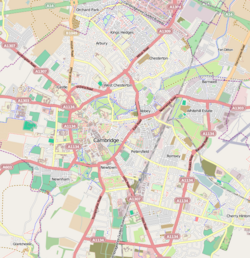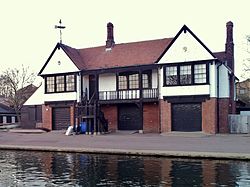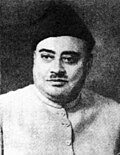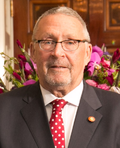| Trinity Hall | |
|---|---|
| University of Cambridge | |
 Entrance to Trinity Hall on Trinity Lane | |
 Arms of Trinity Hall Arms:Sable, a crescent ermine a bordure (engrailed) of the last [1] | |
| Scarf colours: black, with two equally-spaced narrow white stripes | |
| Location | Trinity Lane (map) |
| Coordinates | 52°12′21″N0°06′57″E / 52.2057°N 0.1157°E |
| Full name | The College or Hall of the Holy Trinity in the University of Cambridge |
| Abbreviation | TH [2] |
| Founder | William Bateman, Bishop of Norwich |
| Established | 1350 |
| Named after | The Holy Trinity |
| Sister colleges | |
| Master | Mary Hockaday |
| Undergraduates | 401 (2022-23) |
| Postgraduates | 205 (2022-23) |
| Fellows | 65 [a] |
| Endowment | £89.1 million (2023) [4] |
| Website | www |
| JCR | www |
| MCR | www |
| Boat club | Trinity Hall Boat Club |
| Map | |
Trinity Hall (formally The College or Hall of the Holy Trinity in the University of Cambridge, colloquially "Tit Hall" [5] ) is a constituent college of the University of Cambridge. It is the fifth-oldest surviving college of the university, having been established in 1350 by William Bateman, Bishop of Norwich, to train clergymen in canon law after the Black Death. The college has two sister colleges at the University of Oxford: All Souls and University College.
Contents
- History
- Controversies
- Buildings
- Chapel
- Dining Hall
- Libraries
- Student life
- Combination Rooms
- Societies
- Gallery
- People associated with Trinity Hall
- Masters
- Deans
- Fellows
- Notable alumni
- See also
- Notes
- References
- Bibliography
- External links
The college owns properties in the centre of Cambridge, on Bateman Street and Thompson's Lane, and on its Wychfield site next to Fitzwilliam College, where most of the college's sporting activity takes place. BBC journalist Mary Hockaday became Master in 2022. [6]
Notable alumni include theoretical physicists Stephen Hawking and Nobel Prize winner David Thouless, Australian prime minister Stanley Bruce, Pakistani prime minister Khawaja Nazimuddin, Canadian governor general David Johnston, philosophers Marshall McLuhan and Galen Strawson, Conservative cabinet minister Geoffrey Howe, Charles Howard, 1st Earl of Nottingham, writer J. B. Priestley, and Academy Award-winning actress Rachel Weisz.



































